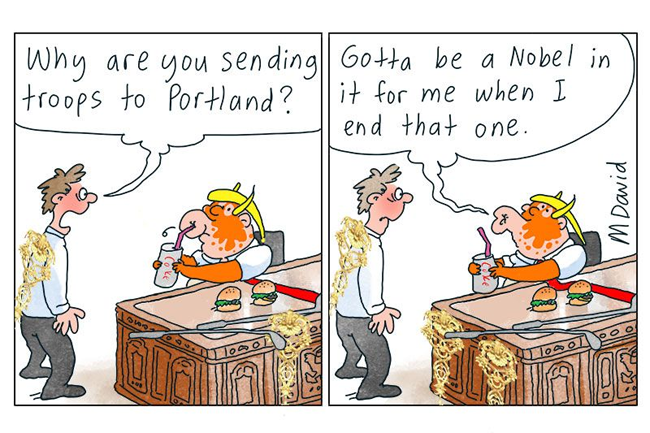Media Sauce is our new weekly column by the inimitable (Doc) Martin Hirst. This week, developments at "our" ABC and the UK's BBC signal global changes in public broadcasting.
A COUPLE OF WEEKS AGO, I wrote a piece about perceptions of bias in the media.
I argued that the appearance of left-wing bias at the ABC was partly a reflection of a more conservative bias in other parts of the media.
I also pointed out that a number of voices I respect in social media have begun calling out what they see as persistent and obvious right-wing bias at the national broadcaster.
In the last week, we’ve had a great example of that. The ABC’s national TV political editor Chris Uhlmann was heavily criticised – and rightly so – for blaming South Australia’s electricity blackout on renewable energy and generating a storm of protest in the process.
Uhlmann’s editorial line dovetailed with the anti-wind coal is "good for humanity" lobby. Social media and the more progressive independent news sites called him out but so far, he has not made any moves to apologise or restore his credibility.
SA power out until at least 4.15am ACST says @Nick_Xenophon. Live blog: https://t.co/uaZVoGkphk #sablackout https://t.co/TU4h3EMiqm
— ABC News 24 (@ABCNews24) September 28, 2016
Renew Economy's Giles Parkinson called Uhlmann the ‘new face of the anti-wind lobby’.
Parkinson then pointed out this gem of a line in Uhlmann’s initial report on the "cause" of the statewide blackout.
“40 per cent of South Australia’s power is wind generated, and that has the problem of being intermittent – and what we understand at the moment is that those turbines aren’t turning because the wind is blowing too fast.” ~ Chris Uhlmann, ABC News
Parkinson said he ‘almost drove my car off the road’ when he heard this on the radio.
But Uhlmann wasn’t finished. A few days later, Giles Parkinson had reason to take the ABC’s most senior Canberra journalist to the cleaners again, accusing Uhlmann of "doubling down" on his earlier absurd claim that renewable energy sources were responsible for the blackout.
Once again Uhlmann is damned with his own words.
Rushing to a target to parade green credentials exposes the electricity network to a serious security risk and, in the long run, risks permanent reputational damage to the renewable energy cause. The grid is being transformed, and that transformation needs to be managed sensibly, or the entire nation might go to black.
I urge IA readers to click the link above and read Uhlmann’s entire opinion piece for themselves.
According to Giles Parkinson, Uhlmann’s advocacy was
‘... more than the fossil fuel industry could ever wish for.’
Then, if you have the stomach for it, read this too. Uhlmann has been scrambling to shore up his initial claims by writing a news item an op-ed about "energy security". I wonder who gave him the documents?
If Uhlmann’s very sloppy "analysis" had appeared under Graham Lloyd’s byline in The Australian, I would not have been surprised.
Lloyd is a well-known apologist for the polluters and a critic of green energy. He is paid by Rupert Murdoch, himself an investor in dirty energy sources, so we might expect him to do his master’s bidding.
But Uhlmann works for the public broadcaster — what some people still, affectionately, if misguidedly, refer to as "our ABC". So why would he provide comfort and support to anti-wind interests?
Despite appearances I don’t think Chris Uhlmann is directly paid by the coal and oil lobby. The simple explanation is that his worldview aligns with the fossil fuel industry.
I am not saying that Uhlmann personally holds these views, but he may well. However, it is clear that in his professional role he sees it as a responsibility to present "both" sides of an argument and not be seen to be too green lest he be accused of "bias" the other way.
I’d also say that this view fits in with the ethos of his new boss, Michelle Guthrie.
I mentioned Guthrie’s arrival at the ABC in my previous piece and noted it was perhaps too early to say what impact her appointment might have on the direction of the national broadcaster.
Just after I made that comment, I saw Margaret Simons profile of Guthrie in The Monthly. Simons makes the same point that it’s too early to know for sure. Despite this, the profile is revealing and it’s not necessarily good news.
Simon’s piece is well-balanced and highlights the concerns of some ABC insiders about Guthrie’s appointment.
Tellingly, after first promising an interview, Simons was not able to speak to Guthrie for her profile piece.
As this extract from Margaret’s essay highlights, her closeness to News Corp may be an ongoing problem for the public broadcaster:
... after weeks of to and fro, in July the Monthly was told that no interview would be taking place for this article. There was no explanation as to why.
Meanwhile, Guthrie gave her first major public speech at the Australian’s Creative Country conference in late July. The combination of the profile piece appearing in the Australian’s magazine and the choice of a News Corp event for her first public speech fed the usual Murdoch conspiracy theories, plus a perception that Guthrie (or her minders) was trying to blunt the venom of the ABC’s leading critics. In the early days of her appointment, Guthrie surprised some by asking “a bit wide-eyed”, according to one source, why the relationship between News Corp and the ABC had to be so bad. ~ Margaret Simons, The Monthly
One of Guthrie’s key messages in her "maiden speech" as head of the ABC was that commercial opportunities and partnerships are high on her agenda. Not surprising, given all the funding cuts and the need to ‘monetize’ content and find alternative "revenue streams".
But this is corporate language, more suited to a profit-centred organisation. Public service should not be about profitability and revenue streams, it should be about promoting the public interest. Guthrie’s critics are right, in my opinion, to be worried about what her real intentions are for "Aunty".
I began this column with a question: Is public broadcasting about to die? Apart from Uhlmann’s capitulation to the energy lobby, I have also been spotting other trends that lead me to think public broadcasting is close to being terminally ill.
Michelle Guthrie’s appointment as CEO at the ABC is one sign but a resignation on the other side of the world also drew my attention to this question this week. The events are not linked (except in my mind) but it is a telling reminder of the changes underway in public broadcasting globally.
Out with the old, in with the new
After beginning as a radio news reporter and rising to director of radio, Helen Boaden ended her 33-year career at the BBC with a shock resignation announcement this week. It must have been a difficult decision, the position attracted a salary of some £400,000 (AU$670,000).
However, as Boaden noted in a public address at the time of her resignation, her departure from the British public broadcaster had been "in discussion" with her boss, BBC Director General, Tony Hall, for some months.
In July this year Hall has signalled his intention to shake up the BBC’s management, as part of a cost-cutting exercise and in response to a government review of the corporation’s charter.
The BBC "governance" review, released in March 2016 called for the BBC Trust to be scrapped and for regulation of the public broadcaster handed over to Ofcom, the commercial media regulator.
This recommendation would push the BBC further in a commercial direction and one of its fiercest critics was …
You guessed it: BBC Director of Radio, Helen Boaden.
Boaden told the Radiodays Europe conference in Paris in March:
"Public service broadcasting subjected to undue political interference over a sustained period becomes state broadcasting. I don’t believe that is what our audiences want. I believe they want strong, independent broadcasters.”
Boaden’s direct criticism of some suggestions in the report probably infuriated her bosses even more. She made an explicit link between recommendations to change the mix of radio programming (her domain inside the BBC) and "a focus only on how to limit the market impact of the BBC".
The main source of complaints about the BBC’s influence in the commercial market is, no surprise, Rupert Murdoch’s toxic News Corp, which has been campaigning against the public broadcaster for decades.
I wonder if Boaden’s discussions with Hall, that have led to her resignation this week, began in earnest after she made her critical comments.Perhaps it went something like this:
Boaden: I don’t like the direction this is taking the BBC.
Hall: It’s time for you to go.
End of discussion
I know the timing of Boaden’s resignation and the appointment of Michelle Guthrie are coincidental and happening on opposite sides of the media planet, but I can’t help but wonder if this is not a signal moment in public broadcasting in the English-speaking world.
Boaden was a 30-year veteran of the BBC and was enculturated into the public service ethos that used to motivate the taxpayer-funded broadcaster. Her replacement, James Purnell, is a career politician and former Labour cabinet minister who only joined the BBC in 2013. His loyalty is not to the Reithian ideals of public service, but to the efficient use of "resources".
Guthrie is more like Purnell than Boaden. Her background is in corporate world, her training is legal, not journalistic. Her vision is not clouded by the idealism of Boaden and her stints with Murdoch and Google reinforce her focus on the bottom-line.
In a climate of radically reducing budgets, this bottom-line view is dangerous.
Funding cuts in the UK and in Australia have led to the winding back of independent news and journalism at the public broadcasters, and a seemingly greater willingness to use the publicly-funded airwaves to package and promote their masters’ voice.
Just a few days ago, we learned that the ABC will no longer be receiving news feeds from some of the world’s leading news agencies. Combined with all the bureau closures in recent years, it means less independent reporting and more reliance on compromised sources – such as the Murdoch newspapers – for Australian news consumers.
Perhaps we will see a further shift towards safe, conservative news and current affairs broadcasting on the ABC. It is something that is likely to further infuriate my Twitter friends — and not without reason.
Read more by Dr Martin Hirst on his blog Ethical Martini and follow him on Twitter @ethicalmartini.

This work is licensed under a Creative Commons Attribution-NonCommercial-NoDerivs 3.0 Australia License
Monthly Donation
Single Donation
Be informed. Subscribe to IA for just $5.









